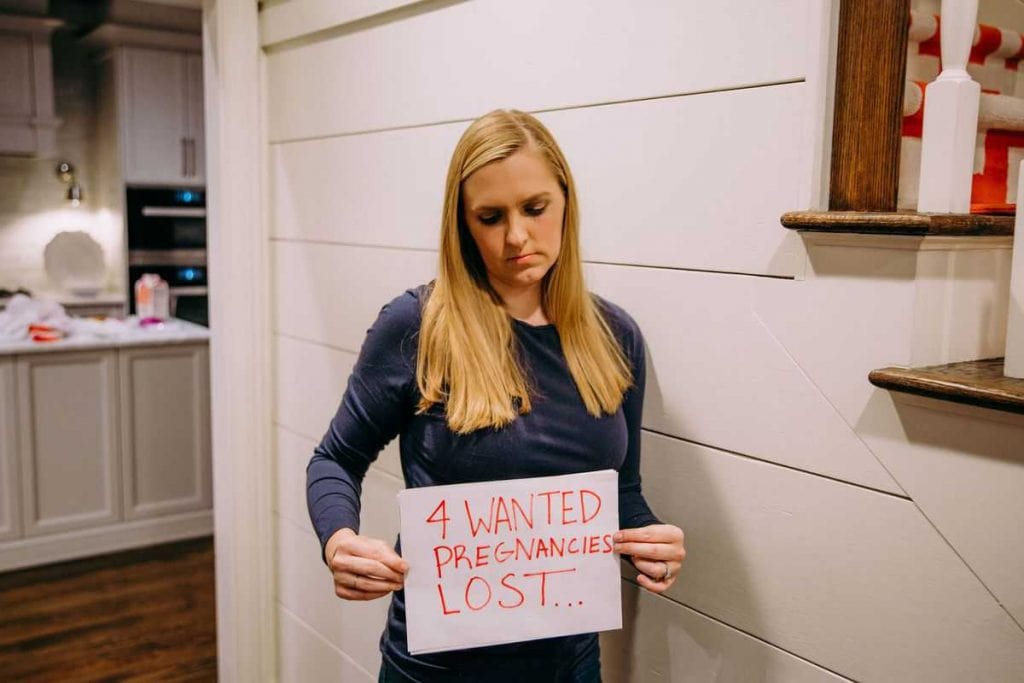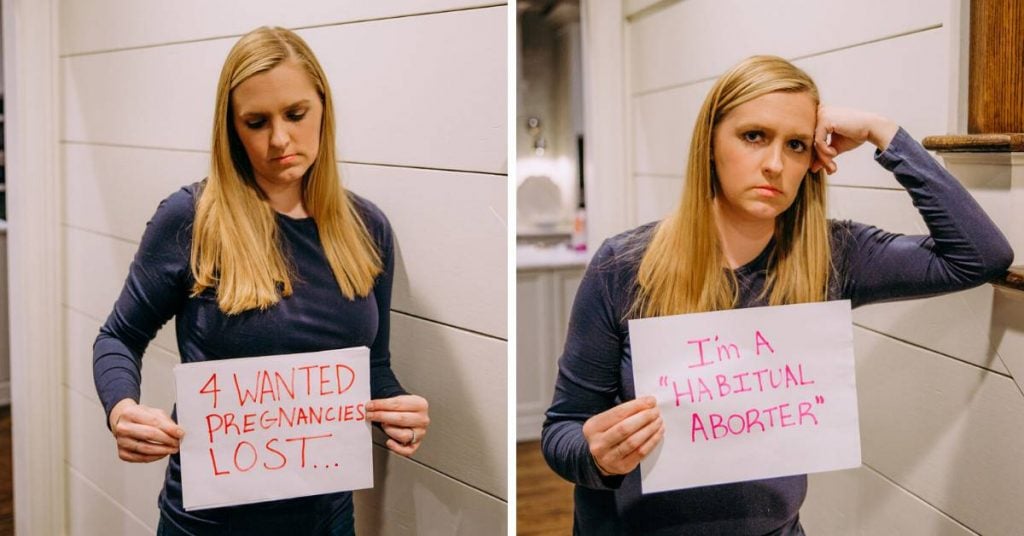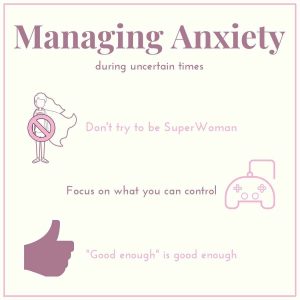The medical terms that define pregnancy loss are detrimental to women. They hurt us. They are odds with our physical and emotional experiences. They are outdated and place blame directly on the women’s body for “carrying badly.” Because no matter how much you want to believe I’m wrong, miscarriage does mean “to carry badly.” Also, the medical term for miscarriage is “abortion,” in various uses. Yet miscarriage vs. abortion? They’re different.
Both of these things are problems. So much about the medical terms we use to talk about women’s bodies are problems.
In this article, I want to begin conversation about how the lay and medical terms for miscarriage are problems and why.

This site contains affiliate links, meaning that we earn a small commission for purchases made through our site. We only recommend products we personally use, love, or have thoroughly vetted.
- My Doctor Is a Rare Breed
- The Word “Miscarriage” Blames Mothers
- Why Don’t We Talk About Miscarriage?
- The Word “Miscarriage” Implies Maternal Failure
- Do All Women Feel Blamed By The Word “Miscarriage?”
- The Medical Term for Miscarriage Is Abortion
- Miscarriage vs Abortion
- What Can We Do?
- Our Language Has Power
My Doctor Is a Rare Breed
After I lost my first pregnancy at 8 1/2 weeks, I was lucky to have a doctor who understood the power of words.
Sitting in her office after learning that my pregnancy was not viable, she kindly walked me through my options while I stared at my phone.
My Options
Option 1: Wait to miscarry naturally, though she didn’t recommend it since my body wasn’t recognizing the loss. This is called a “missed miscarriage,” but medical charts usually label it a “missed abortion.”
Option 2: I could take a pill that induces miscarriage (brand name: Cytotec; generic: Misoprostol). This works well for some people, but I had heard horror stories and of pharmacists refusing to fill it, calling it an “abortion pill.”
Option 3: I could undergo surgery–a dilation and curettage (D&C), as it’s called–in which my OB would physically clean out all the contents of my uterus.
I couldn’t look at my doctor while she discussed these options. After confirming that I was not, in fact, videoing her with the phone I refused to put down, she smiled knowingly. She understood my inability to make eye contact.
But she forced me to put down my phone and look her in the eye so she could say one thing:
“This is not your fault. Nothing you did could have caused this. You could not have prevented this. You did nothing wrong.”
Nadine Becker, MD
This Type of Reassurance is Rare
That’s part of the reason nearly half of miscarrying mothers admit to feeling guilt or self-blame (47%, according to a survey conducted by the American College of Obstetrics and Gynecology).
Let me be clear about one thing: women do not cause the losses of wanted pregnancies.
You know what does not cause a miscarriage?
- Stress
- Lifting heavy objects or toddlers
- Drinking a cup of coffee
- Having a glass of wine
- Doing dishes or laundry
- Exercising to the same level as pre-pregnancy
- Straining too hard to use the bathroom
- Vinegar (I’m serious. There are people who think that)
- Sex
Why do miscarriages occur?
- Fetal genetic abnormalities (in other words, chromosomes don’t come together in a way that is compatible with life)
- Physical anomalies within the mother’s body (this includes uterine abnormalities, blood clots, pools of blood in the gestational sac, major autoimmune disorders, and probably more that I don’t know about)
- Extreme trauma (like a major car accident)
This should be very clear: the miscarrying mother is not at fault.
The Word “Miscarriage” Blames Mothers
And yet, knowing we’re not at fault, nearly half of us admit to feeling guilty, while many others feel it but don’t admit to it.
And here’s the thing.
Why wouldn’t we feel guilty?
The language surrounding this incredibly traumatic bodily experience can make us feel this way.
To some, the term “miscarriage” is just that–medical. It implies that an “abortion” (the actual medical term for miscarriage), or ending of a pregnancy, occurred. Some people have no problem with this term, and that’s okay.
But trust me (and keep reading), the word “miscarriage” directly implies that the mother played a role in losing her pregnancy. Even though, as I’ve already shown, it is not the mother’s fault.
And the word “abortion” implies even further blame, as if our losses were choices. It did not originally carry that meaning, but it has been socially and politically co-opted so that it now carries connotations of an elective choice.
The medical term for miscarriage uses outdated terminology that now is used to describe a reproductive choice, and that is at extreme odds with the experience of a woman who loses a wanted pregnancy.
We need to know why these words are hurtful. We need to find better words. Because words matter.
For Many, “Miscarriage” Feels Like Failure
In her recent memoir, Becoming, Michelle Obama opens up about her own miscarriage some 20 years ago.
Ahead of her book’s release, Obama revealed to 20/20’s Robin Roberts that, upon losing a pregnancy 20 years ago, she felt like she had “failed.”
And her words go even further. We hurt one another, she tells Roberts, by not talking more openly about miscarriage.
“I think it’s the worst thing that we do to each other as women, not share the truth about our bodies and how they work and how they don’t work.”
Michelle Obama
More recently, on Good Morning America, Meghan McCain admitted to the many ways in which she blamed herself for the loss of her pregnancy.
“I was very, very, very hard on myself. And I blamed the stress of my life and I blamed being older and I blamed my personality and I blamed things that were not rational.”
Meghan McCain
If these politically famous celebrities, who have had tremendous access to education and a strong understandings of women’s bodies, feel to blame, why wouldn’t the rest of us?
Part of the problem stems from our historical silence on the subject of miscarriage. Another part is the result of our lack of understanding about what causes miscarriage.
This is further exacerbated by the hurtful things people say as a result of these previous two issues–people don’t know what to say to someone who had a miscarriage, and their words often make us feel worse.
And that’s really the root of the problem. Words.
Either we don’t use them, so our experience are veiled in silence and confusion.
Or we do use them, but we necessarily use words that do implicit harm to the mother experiencing loss.
“Miscarriage” and “abortion” both do harm.
Why Don’t We Talk About Miscarriage?
The truth is, an estimated 1 in 4 pregnancies ends in miscarriage.
And yet, the subject is under-researched, underfunded, still far too silenced, and the medical term for miscarriage remains outdated and hurtful.
So why don’t we share these truths?
In recent years, there have been abundant opportunities to open national discourse about miscarriage.
These opportunities are especially strong when celebrities speak about pregnancy loss: Pink in 2010, Beyoncé and Gwyneth Paltrow in 2013, Gabrielle Union in 2017.
Celebrities inherently have platforms and voices, so every time one speaks out, news outlets pick up their story, and I hope we might finally have this conversation.
Can Influential Voices Finally Spark A Lasting Conversation?
With the inclusion of voices like Michelle Obama and Meghan McCain in this public conversation, the subject is receiving what I hope will be more lasting attention.
Obama’s words in Becoming are few, but their impact is powerful.
“A miscarriage is lonely, painful, and demoralizing almost on a cellular level,” she says. “When you have one, you will likely mistake it for a personal failure, which it is not.”
Michelle Obama
Indeed, Michelle–yeah, I like to believe we’re personal friends and on a first-name basis, so what?–It is not.
McCain also reminds us that we shouldn’t blame ourselves, even though she initially did.
“I, since then, have just tried to go a little easier on myself on all things having to do with motherhood and pregnancy-related, because it’s not easy being a woman. It’s just not. And I know how hard I was on myself and I’m sure a lot of women do the same thing.”
Meghan McCain
Indeed, Meghan, they do. And you’re right, it’s not easy being a woman. Thank you for saying that.
Two women. Two opposite political views. But they get along, as far as I can tell, and they share this same female experience–understanding that we should not blame ourselves for the very common experience of pregnancy loss, even though we DO.
Let’s let their words lead us to examine our own.
The Word “Miscarriage” Suggests Guilt
The language we use to talk about pregnancy loss intrinsically suggests that it is, in fact, a personal failure. Prior to Obama and McCain’s discussion of pregnancy loss at large, two specific celebrities noted this linguistic problem and pushed for change.
Big Bang Theory’s Melissa Rauch argued in her 2017 article for Glamour that miscarriage “deserves to be ranked as one of the worst, most blame-inducing medical terms ever. To me, it immediately conjures up an implication that it was the woman’s fault, like she somehow ‘mishandled the carrying of this baby.”
Abundant news outlets shared Rauch’s story, but there was no major movement to change the word, no viral hashtag, no communities coming together to support the change.
Then, on September 7, 2018, Dawson’s Creek star James Van Der Beek posted an Instagram photo imploring society to find a new word for “miscarriage.”
The prefix “mis,” he said, “insidious[ly] suggests the fault of the mother—as if she dropped something, or failed to ‘carry.’” He used the hashtag #WeNeedANewName.
Van Der Beek’s post got huge traction and coverage in the media, but the hashtag barely caught on. Perhaps this was because it highlighted the problem without proposing a solution. Maybe society wasn’t quite ready.
Or most likely, perhaps real change regarding the way we talk about women’s bodies must begin with the voices of women.
I’m a woman. I also happen to have a PhD in English, which means that breaking down language is kind of my thing.
Oh, and in case you missed the memo, I have a lot of experience with miscarriage. Recurrent miscarriage, specifically.
So let’s have this conversation.

The Word “Miscarriage” Implies Maternal Failure
In terms of the English language, the Oxford English Dictionary (OED) is the definitive source for understanding everyday language, its origin, and history. All of my research comes from the OED.
One definition of “miscarriage,” which the OED says originated in the 16th century, is “failure,” “blunder,” or “mistake.” Another is “the spontaneous expulsion of a fetus from the womb before it is viable.”
Although listed separately, both definitions exist for the same word, which makes it difficult not to conflate the two.
This “spontaneous expulsion,” it seems, is by definition a “failure.”
But let’s move beyond mere definition and consider the etymology of the word. In other words, how did it come to be a word in the first place?
“Mis” is a prefix of Germanic origin that suggests the word it describes was handled “badly,” “wrongly,” or even “perversely.”
“Carriage” refers to the actual “carrying” of the fetus, hence the word “miscarry.” “Carry” is commonly used in reference to pregnancy; a woman is “carrying a baby” or “carrying to term.”
By saying that a woman has miscarried, we are saying that she has “badly,” “wrongly,” or “perversely” handled the carrying of her pregnancy.
However unintended, there is no way to separate the word “miscarry” from blaming the one who has miscarried: the mother.
Do All Women Feel Blamed By The Word “Miscarriage?”
No. In fact, to be honest, I don’t feel blamed by the word miscarriage. But that’s not the point.
The point is that we’ve spent centuries silencing this subject, and when we DO talk about it, we use words that historically and inherently blame the mother.
I can honestly say I’ve never heard someone use the word “miscarriage” and felt personally attacked. But I cannot say that the 47% of women who feel at fault for their losses are not in some way influenced by the word itself.
This influence is not explicit. It’s not something any of us are aware of. But has the possibility engrained itself in our minds our entire lives?
Very possibly.
Because language has the power to subtly, implicitly influence our beliefs without our knowledge. That’s my concern here.
The Medical Term for Miscarriage Is Abortion
As if coping with miscarriage weren’t hard enough, dear God I hope the loss mother never sees her medical chart.
When I sat down with my empathetic doctor to discuss the results of my recurrent miscarriage workup, she warned me about the words I would see on my chart.
She wouldn’t have shown it to me at all, but she wanted to be able to flip through the pages-upon-pages of test results and explain them.
She placed the chart in front of me, and my eyes were instantly drawn to the unmistakable words at the very top.
“Habitual aborter.”

You heard me.
What is the technical term for miscarriage? “Abortion.”
It’s Actually Note Quite that Simple
The specific term depends on the type of miscarriage, as there are many different types of miscarriage.
What are the different types of miscarriage? They really vary so much, and it depends a lot on how they are categorized. We can look at miscarriage based on whether it’s complete or incomplete, how it’s being treated (is surgery required or did it happen naturally?), and more.
Here are a few of the major types of miscarriage, but even these don’t break down into the easy categories it sounds like.
Chemical Pregnancy: A “chemical pregnancy” occurs when miscarriage begins shortly after implantation, usually before the expectant mother can even see a doctor. Many families still grieve this type of miscarriage as a they would any other. Please treat it as such.
Blighted Ovum: Called both a “blighted ovum” (BO) and an ”anembryonic pregnancy,” this type of loss occurs when a fertilized egg attaches to a uterine wall but does not develop. It’s most often discovered at an ultrasound where the expectant mother is informed that her gestational sac is growing, but there is nothing inside. A blighted ovum is still a loss and families still grieve the life of a child they’d dreamed of. More on this another day.
Ectopic Pregnancy: An ectopic pregnancy is called by the same name in both lay terms and medical ones. Also called a “tubal pregnancy,” this type of loss occurs when an embryo implants in a woman’s fallopian tube instead of her uterus. It can be life threatening, so know the signs and symptoms.
Spontaneous Miscarriage: In medical terms, this is called a “spontaneous abortion.” This occurs when an expectant mother begins cramping and bleeding with no prior warning.
Missed Miscarriage: In medical terms, often called a “missed abortion.” With a missed miscarriage, you experience few to no symptoms. Everything seems to be going along fine. Then, you go to the doctor, and you find out there’s no heartbeat.
But it’s not that simple.
For instance, my blighted ovum was also a missed miscarriage—my gestational sac continued to grow, I experienced full pregnancy symptoms (hello being wrapped around a toilet!), and my body didn’t recognize that nothing was growing inside that sac.
This is one of the problems with language that categorizes our experiences—it appears to place us into boxes into which we don’t necessarily fit.
You can have multiple of these types of losses, and you may have a completely different experience with them than someone else—or even than you did previously.
Miscarriage vs Abortion
What is the difference between a miscarriage and an abortion?
“Abortion,” as a medical term, “derives from the Latin aboriri—to miscarry.” Etymologically, the two words are the same.
But to the layperson, “abortion” refers to the elective termination of a pregnancy. Regardless of political beliefs about abortion rights, the use of this word to describe mothers grieving the loss of wanted pregnancies is harmful.
Grieving mothers are labeled with emotionally insensitive, outdated language that is at odds with their experiences.
These are the feelings Michelle Obama describes going through 20 years ago. They are the same feelings I experienced during recurrent pregnancy loss just a few years ago.
Because I suffer from recurrent miscarriage, I’m said to abort “habitually.”
Even my caring, empathetic doctor is constrained by the language of her field.
And the conflation of miscarriage and abortion becomes even more complicated when it comes to the realities of losing a pregnancy.
I already mentioned that women sometimes face scrutiny from pharmacists who refuse to fill a misoprostol prescription, calling it an “abortion pill” even though it’s being prescribed by a medical doctor for a wanted pregnancy that has already ended.
Cost Forces Many Women to Push Through Abortion Protestors to Seek Miscarriage Treatment
I also know many women who have had to cross picket lines into “abortion clinics” to have a D&C performed.
I’ve been asked on multiple occasions, “Can you go to Planned Parenthood for a miscarriage?” The answer is yes. And many women do.
Because even with insurance, having a D&C can be exceedingly expensive. Mine was $7k. Take a minute to wrap your brain around that.

With a hospital procedure being so cost prohibitive, many women seek help from organizations like Planned Parenthood to end an already lost pregnancy they desperately wanted.
This is not about politics. It’s not about reproductive rights.
It’s about the fact that our language and our institutional systems have conflated these two vastly different experiences in a way that puts miscarrying mothers in hard, uncomfortable situations, when they’re already going through enough.
What Can We Do?
If I were certain of the answer, it’d be done by now. But I think there are a lot of “small” things we can do.
On an individual level, we can learn how to support someone after miscarriage.
On a larger level, we can lobby for policies that will support miscarrying mothers. We need to make research, education, and treatment more accessible and affordable.
And on a longer-term level, we can shift our language.
Remember, the biases language implicitly instill in us develop slowly. Changing the words we use won’t suddenly stop making women feel guilty about their losses, but overtime, it could have an impact.
My preferred term is pregnancy loss.
I say that I lost multiple pregnancies.
Admittedly, this phrase does’t work for everyone. Again, I don’t have all the answers.
But I’ve had miscarrying moms tell me that the term “pregnancy loss” makes them feel worse, as if they have more to grieve.
To which I can only say, “Valid point.”
So I don’t know what the answer is. But I do know this.
Our Language Has Power
We must consider the impact of the words we use to describe women’s health.
We must find language that gives women ownership over their own bodies and reproductive experiences.
We must talk about, as Obama says, how women’s bodies work, and “how they don’t work.”
And, we must have this conversation. So let’s have it.
What term do you prefer as the everyday term for miscarriage? Let us know in the comments.





I suppose if it’s going to be a generic term, “Incomplete pregnancy” is a fairly neutral and clinical phrase. It hopefully wouldn’t imply any failure on the part of the mother, just that the pregnancy didn’t complete for whatever reason.
This is a fascinating suggestion. I’d love to know what lots of other loss moms think about this!
Thanks so much for writing this. I personally prefer “pregnancy loss” to “miscarriage” or “incomplete pregnancy”. Miscarriage makes me feel like I carried badly/dropped the ball in an effort that is so precious to me. Incomplete pregnancy could kind of imply that I didn’t completely have or love my baby, although I would love that acknowledgement that even an early loss can “count” as motherhood. You’re right that words make a difference. But I also see how different people find particular words supportive or hurtful, so it’s hard to have a one size fits all. I do think it’s helpful to mirror whatever language the mom is using (whether she says miscarriage or pregnancy loss, etc. and just go with that when talking to her).
I am doing research on the history of women who have gone through exactly what your readers and you have experienced. I was never pregnant, but my mother had 15 miscarriages, which affected her profoundly. I knew none of her history until one day she asked me if I felt as if I was unwanted. I said yes. She said that she had three miscarriages between Linda and Martha, and another 12 miscarriages between Martha and me. I cannot imagine living her story. She said “Once I knew you were a live birth, I didn’t worry about you.” So much information carried in that sentence. I am now 72 and Mom is long gone. However, I am full of questions about women who struggle with such ground-shifting experiences. I am reading your information, especially because it is not medical language.